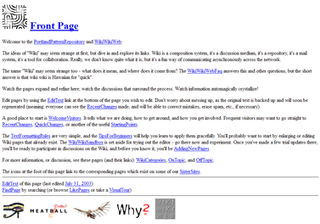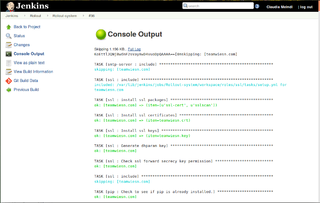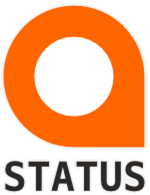Related Research Articles

Mandriva Linux is a discontinued Linux distribution developed by Mandriva S.A.

MySQL is an open-source relational database management system (RDBMS). Its name is a combination of "My", the name of co-founder Michael Widenius's daughter, and "SQL", the abbreviation for Structured Query Language. A relational database organizes data into one or more data tables in which data types may be related to each other; these relations help structure the data. SQL is a language programmers use to create, modify and extract data from the relational database, as well as control user access to the database. In addition to relational databases and SQL, an RDBMS like MySQL works with an operating system to implement a relational database in a computer's storage system, manages users, allows for network access and facilitates testing database integrity and creation of backups.

A wiki is a hypertext publication collaboratively edited and managed by its own audience directly using a web browser. A typical wiki contains multiple pages for the subjects or scope of the project and could be either open to the public or limited to use within an organization for maintaining its internal knowledge base.

The WikiWikiWeb is the first wiki, or user-editable website. It was launched on 25 March 1995 by its inventor, programmer Ward Cunningham, to accompany the Portland Pattern Repository website discussing software design patterns. The name WikiWikiWeb originally also applied to the wiki software that operated the website, written in the Perl programming language and later renamed to "WikiBase". The site is frequently referred to by its users as simply "Wiki", and a convention established among users of the early network of wiki sites that followed was that using the word with a capitalized W referred exclusively to the original site.

Howard G. Cunningham is an American computer programmer who developed the first wiki and was a co-author of the Manifesto for Agile Software Development. A pioneer in both design patterns and extreme programming, he started coding the WikiWikiWeb in 1994, and installed it on c2.com on March 25, 1995, as an add-on to the Portland Pattern Repository. He co-authored a book about wikis, entitled The Wiki Way, and invented the Framework for Integrated Tests.

A Wiki software is collaborative software that runs a wiki, which allows users to create and collaboratively edit pages or entries via a web browser. A wiki system is usually a web application that runs on one or more web servers. The content, including previous revisions, is usually stored in either a file system or a database. Wikis are a type of web content management system, and the most commonly supported off-the-shelf software that web hosting facilities offer.

Sodipodi was an open-source vector graphics editor, discontinued in 2004. It is the predecessor to Inkscape.
The Portland Pattern Repository (PPR) is a repository for computer programming software design patterns. It was accompanied by a companion website, WikiWikiWeb, which was the world's first wiki. The repository has an emphasis on Extreme Programming, and it is hosted by Cunningham & Cunningham (C2) of Portland, Oregon. The PPR's motto is "People, Projects & Patterns".

Shibboleth is a single sign-on log-in system for computer networks and the Internet. It allows people to sign in using just one identity to various systems run by federations of different organizations or institutions. The federations are often universities or public service organizations.

The history of wikis begins in 1994, when Ward Cunningham gave the name "WikiWikiWeb" to the knowledge base, which ran on his company's website at c2.com, and the wiki software that powered it. The "wiki went public" in March 1995—the date used in anniversary celebrations of the wiki's origins. c2.com is thus the first true wiki, or a website with pages and links that can be easily edited via the browser, with a reliable version history for each page. He chose "WikiWikiWeb" as the name based on his memories of the "Wiki Wiki Shuttle" at Honolulu International Airport, and because "wiki" is the Hawaiian word for "quick".
Redmine is a free and open source, web-based project management and issue tracking tool. It allows users to manage multiple projects and associated subprojects. It features per project wikis and forums, time tracking, and flexible, role-based access control. It includes a calendar and Gantt charts to aid visual representation of projects and their deadlines. Redmine integrates with various version control systems and includes a repository browser and diff viewer.

Google Wave, later known as Apache Wave, was a software framework for real-time collaborative editing online. Originally developed by Google and announced on 28 May 2009, it was renamed to Apache Wave when the project was adopted by the Apache Software Foundation as an incubator project in 2010.

Jenkins is a free and open source automation server. It helps automate the parts of software development related to building, testing, and deploying, facilitating continuous integration and continuous delivery. It is a server-based system that runs in servlet containers such as Apache Tomcat. It supports version control tools, including AccuRev, CVS, Subversion, Git, Mercurial, Perforce, ClearCase and RTC, and can execute Apache Ant, Apache Maven and sbt based projects as well as arbitrary shell scripts and Windows batch commands.

OStatus is an open standard for federated microblogging, allowing users on one website to send and receive status updates with users on another website. The standard describes how a suite of open protocols, including Atom, Activity Streams, WebSub, Salmon, and WebFinger, can be used together, which enables different microblogging server implementations to route status updates between their users back-and-forth, in near real-time.

MATE is a desktop environment composed of free and open-source software that runs on Linux and BSD operating systems. An Argentine user of Arch Linux started the MATE project to fork and continue GNOME 2 in response to the negative reception of GNOME 3, which had replaced its traditional taskbar with GNOME Shell. MATE aims to maintain and continue the latest GNOME 2 code base, frameworks, and core applications.

Foswiki is an enterprise wiki, typically used to run a collaboration platform, knowledge base or document management system. Users can create wiki applications using the Topic Markup Language (TML), and developers can extend its functionality with plugins.

WikiTree, a free, shared social-networking genealogy website, allows users individually to research and to contribute to their own personal family trees while building and collaborating on a singular worldwide family tree within the same system. Chris Whitten, developer of the WikiAnswers website, set up WikiTree in 2008; the site is owned and hosted by Interesting.com, Inc. The site uses a “wiki markup" language that offers users the ability to create and edit personal profiles, categories and "free space" pages to document their family's history. As of July 2021 the WikiTree website had more than 800,000 registered members and included more than 27 million profiles, with 8.5 million having DNA connections. GenealogyInTime Magazine listed WikiTree as the 15th most popular genealogy site in January 2016.

The Fediverse is an ensemble of federated servers that are used for web publishing and file hosting, but which, while independently hosted, can communicate with each other. On different servers (instances), users can create so-called identities. These identities are able to communicate over the boundaries of the instances because the software running on the servers supports one or more communication protocols which follow an open standard. As an identity on the fediverse, users are able to post text and other media, or to follow posts by other identities. In some cases, users can even show or share data publicly or to a selected group of identities and allow other identities to edit other users' data.
References
- ↑ "Wiki Inventor Sticks a Fork in His Baby". wired.com. 4 July 2012. Retrieved 2015-01-07.
- ↑ "Ward Cunningham's Smallest Federated Wiki Paves Road To Our Curated Future". semanticweb.com. 9 March 2012. Retrieved 2015-01-07.
- ↑ "A modern wiki for a modern internet: the Smallest Federated Wiki on The GovLab's Demos for Democracy". thegovlab.org. 15 August 2014. Archived from the original on 2020-10-29. Retrieved 2015-01-07.
- ↑ "Federated Education: New Directions in Digital Collaboration". hapgood.us. 6 November 2014. Retrieved 2015-01-07.